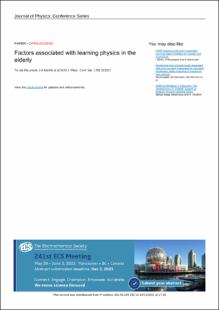Factors associated with learning physics in the elderly
...
Vergel Ortega, Mawency | 2020-12-05
The research aims to identify the factors associated with learning physics in older students. A quantitative investigation is carried out with a field-type factorial analysis method, correlational in a sample of 80 physics students, university students over 30 years of age, who apply science, technology, art and physics through designs and simulations in vector fields, perceptual geo-materializations and electrical physics. The research used as a technique the metacognitive skills inventory test (α = 0.82), the educational motivation scale (α = 0.71), the Tennessee self-concept scale (α = 0.725), the psychological well-being scale adult (α = 0.75) and the social skills scale (α = 0.801). The results show that variables associated with the learning of physics in elderly were the extrinsic motivation index, the motivation intrinsic and demotivating; the active, reflective, theoretical and pragmatic learning style; performance variables, level of learning, spatial reasoning and sensitivity. The results obtained indicate an acceptable fit in the proposed model (X2 = 652.55/gl = 3.05), GFI (goodness of fit index) = 0.894, AGFI (corrected goodness of fit index) = 0.848, RMSEA (mean square approximation error) = 0.09, IFI (incremental adjustment index) = 0.930. The explained variance is 31.9% regarding learning style, 38.8% regarding motivation and 15.1% regarding cognitive score and 15.1% regarding consciousness deficit. It is concluded that the predictive factors of learning of physics in older adults were learning style, motivation indices, cognitive score and consciousness deficit.
LEER










